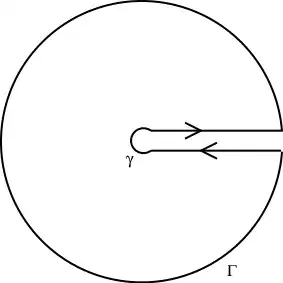This is the same as @JackD'Aurizio's solution, with the steps filled in to make it a little easier to follow.
Let $z=x^2$
\begin{align}
\int\limits_{0}^{\infty} \frac{x^{a}}{1+x^{2}} \mathrm{d}x
&= \frac{1}{2} \int\limits_{0}^{\infty} z^{(a-1)/2} \frac{\mathrm{d}z}{1+z} \\
\tag{a}
&= \frac{1}{2} \mathrm{B}\left(\frac{a+1}{2}, 1-\frac{a+1}{2} \right) \\
\tag{b}
& = \frac{1}{2} \Gamma\left(\frac{a+1}{2}\right) \Gamma\left(1-\frac{a+1}{2}\right) \\
\tag{c}
&= \frac{\pi}{2\sin(\pi(a+1)/2)}
\end{align}
a. We used the following definition of the beta function
$$\mathrm{B}(a.b)=\int\limits_{0}^{\infty} \frac{z^{a-1}}{1+z^{a+b}} \mathrm{d}z$$
b. $$\mathrm{B}(a.b)=\frac{\Gamma(a)\Gamma(b)}{\Gamma(a+b)}$$
c. Euler reflection formula. $$\Gamma(1-z)\Gamma(z)=\frac{\pi}{\sin(\pi z)}$$
We can also evaluate this integral via contour integration.
Let
\begin{equation}
f(z) = \frac{z^{a}}{1+z^{2}}
\end{equation}
Using the keyhole contour, we have first order poles at $\pm i$, so the residues are
\begin{equation}
\mathrm{Res}[f(z),i] = \frac{i^{a}}{i2} = \mathrm{e}^{ia\pi/2} \frac{1}{i2}
\end{equation}
\begin{equation}
\mathrm{Res}[f(z),-i] = \frac{(-i)^{a}}{-i2} = -\mathrm{e}^{ia\pi} \mathrm{e}^{ia\pi/2} \frac{1}{i2}
\end{equation}
\begin{align}
\oint\limits_{C} f(z) \mathrm{d}z
&= \pi \mathrm{e}^{ia\pi/2} \left(1 - \mathrm{e}^{ia\pi} \right) \\
&= \lim_{\epsilon,R \to 0,\infty} \int\limits_{\epsilon}^{R} f(x) \mathrm{d}x
+ \int\limits_{\Gamma} f(z)\mathrm{d}z
+ \int\limits_{R}^{\epsilon} f(x) \mathrm{d}x
+ \int\limits_{\gamma} f(z)\mathrm{d}z \\
&= \int\limits_{0}^{\infty} \frac{x^{a}}{1+x^{2}} \mathrm{d}x
\,- \int\limits_{0}^{\infty} \mathrm{e}^{ia2\pi} \frac{x^{a}}{1+x^{2}} \mathrm{d}x \\
&= \left(1 - \mathrm{e}^{ia2\pi} \right) \int\limits_{0}^{\infty} \frac{x^{a}}{1+x^{2}} \mathrm{d}x
\end{align}
Thus we have
\begin{align}
\int\limits_{0}^{\infty} \frac{x^{a}}{1+x^{2}} \mathrm{d}x
&= \pi \mathrm{e}^{ia\pi/2} \left(1 - \mathrm{e}^{ia\pi} \right) \frac{1}{\left(1 - \mathrm{e}^{ia2\pi} \right)} \\
&= \frac{\pi \sin(a\pi/2)}{\sin(a\pi)} \\
&= \frac{\pi}{2\cos(a\pi/2)}
\end{align}

Notes:
R is the radius of the large circle $\Gamma$.
$\epsilon$ is the radius of the small circle $\gamma$.
